Menu


Are mushrooms good for dogs? The general consensus is technically yes, with some reservations.
Dogs are omnivores, meaning they can eat both plants and animals. This is why it is common for commercial dog food to contain not only meat but also grains and vegetables. However, mushrooms are technically not vegetables (nor plants, for that matter).
Mushrooms belong to their own kingdom called “Fungi.” We don’t find mushrooms as ingredients in pet food, so you may be wondering: can you feed mushrooms to your dogs safely?
The answer to that question is a qualified “Yes,” depending on the type of mushroom. Mushrooms that are edible or used for wellness for humans are also safe for dogs to eat. However, there are some species of mushrooms (e.g., poisonous mushrooms and psychedelic mushrooms) that are not safe for dogs to eat because they can cause mushroom poisoning, which can lead to serious adverse reactions and even death.
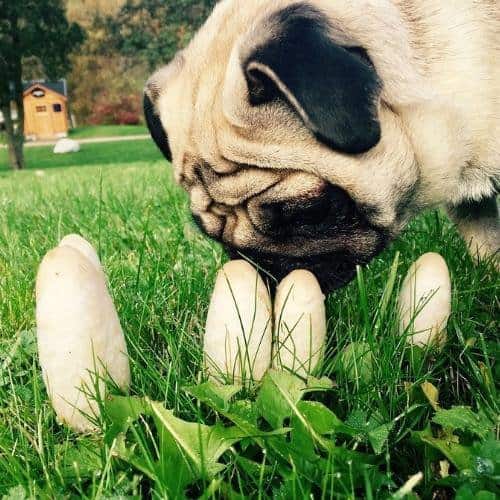
The mushrooms that are safe for our dog and cat friends to consume are also highly BENEFICIAL for their health. However, it is important to only feed them non-toxic mushrooms you can buy from the store.
Supplementing your dog’s diet with cooked mushrooms and dishes infused with mushroom extracts can promote their wellness and longevity and can help a pet who has specific health concerns.
This article explains which types of mushrooms are safe for dogs and cats to consume and which are definitely NOT safe. Also, you will learn which mushrooms you should consider giving to your pet as a supplement.
In This Article:
Maybe you’ve been asking yourself, “Can my dogs eat mushrooms they encounter on hikes or in my backyard?” Your four-legged friend may be very curious about those wonderfully unusual and sometimes smelly fungal organisms (mushrooms) it sees on walks.
Have you ever noticed that certain mushrooms in the wild have been gnawed on by some creature or other and wondered if your dog can safely nibble on these?
Wild mushrooms can be safe to eat, or could be poisonous, and many times it takes an expert in mushroom identification to separate the safe from the toxic mushrooms.
My advice, as a veterinarian who has tried to treat many wild mushroom poisonings over my 30 years in clinical practice, is that it is not safe for your dog to eat ANY wild mushrooms. For this reason, it is better to err on the side of safety than to find out that the mushroom your dog ate was not safe and eating it may have cost its life or the health of its liver.
This is why it’s always best that dogs eat cooked mushrooms or store-bought mushrooms instead.
Can dogs eat raw mushrooms from the wild? The answer to that is sometimes.
There are safe wild mushrooms, but unless you are an expert on identification, again, I recommend avoiding them. Even experts in mushroom identification can make errors and find themselves in the emergency room with a liver that has been destroyed by mushroom toxins.
Ultimately, the best way to prevent your dog from eating mushrooms in the wild is to keep a close eye on them (sometimes the impossible dream when you are on a hike!), and to steer them away from mushrooms growing wild.
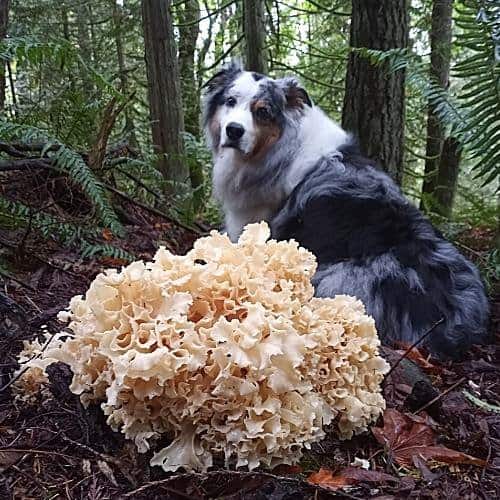
If you do see your dog eating a mushroom, stop them immediately. Assess how much they may have ingested and collect the remaining mushrooms for identification. It’s important to recognize the mushroom for identification in case it is toxic, so an antidote to that toxic mushroom species, if available, can be used for your dog in the veterinary emergency room.
If your dogs eat toxic mushrooms, they may not show signs of it for hours, long after the mushroom toxicity has already started, and possibly too late to induce vomiting or use any antidote, if available.
Inducing vomiting in your pet immediately upon finding it eating an unknown mushroom may help expel the toxic mushrooms from their digestive system. But, if you are on a hike, you may not be carrying any hydrogen peroxide, which you could give to your dog to induce vomiting. A teaspoon of hydrogen peroxide administered into the back of your dog’s mouth will foam and induce it to vomit. If it doesn’t work the first time, try again with a larger volume.

The most common first sign of mushroom toxicity is vomiting. If your dog is lucky, it will vomit the entire mushroom before it gets into their system.
However, it is more common for a dog to vomit due to the mushroom toxins already impacting their system. Following the vomiting, diarrhea is possible, as is loss of appetite and lethargy, in the short term, and it is possible that the mushroom toxins will make your dog’s liver fail, and death may result.
If you suspect mushroom toxicity in your pet following a hike, get them to an animal emergency room as soon as you can, and bring some of the mushrooms with you, if possible. If you can induce vomiting immediately, as described above, be sure to do that.
At the animal ER they will provide supportive therapy, with IV fluids and anti-nausea drugs to help control the symptoms. In Europe where people love to hunt wild mushrooms, they keep their ERs stocked with the injectable antidote to mushroom toxicity from the Amanita species.
Silymarin is the name of the Amanita poisoning antidote. Milk thistle seed is the main ingredient in Silymarin. However, you may not be so lucky in the US or Canada.
But, you can give your dog silymarin capsules orally if they hold them down, and that can substantially help the liver overcome this mushroom toxicity. There are other treatments as well, which are beyond the scope of this article.

Dogs can safely eat any culinary or store-bought mushrooms that are also safe for you to eat. In general, it’s recommended for both humans and their pets to cook mushrooms first before eating them. This is due in part to the high fiber and indigestible fiber found in raw mushrooms, and cooking improves their digestibility.
There are many types of mushrooms that are edible and also beneficial for your dog’s diet dand health. Here are three culinary mushrooms that also have health benefits for your dog:
Lion’s Mane mushroom - This culinary mushroom contains unique constituents called hericenones and erinacines that may help with the growth and health of nerve cells, as well as with cognitive function and motor function especially in our aging pets [3] [4].

Are mushrooms good for dogs, even if they’re in powdered form? Absolutely. Adding mushroom supplement capsules and powder to their meals also makes it easier to overwrite the bitter taste of some mushroom species.
Mushroom extracts increase the digestibility and absorption of the important healthy molecules found in mushrooms. The fresh mushroom is first dried, and then the dried mushroom is subjected to a hot water extraction process that breaks down the fiber and releases all the health-supporting “goodies” that the mushroom contains.
Some mushrooms have a large component of fat soluble medicinal molecules like terpenes, and for those mushrooms (Reishi is one example), a dual extraction process involves using both hot water extraction and extraction using ethanol will include these fat soluble molecules in the final mushroom extract.
It is safe for dogs and cats to ingest these mushroom extracts at amounts that have been found to be healthy for people in experimental studies.
If you want to include mushrooms in your dog’s food, consider one or more of these three options:
There are many benefits to the use of medicinal mushrooms in all animals, two-legged and four. Mushrooms have been in use by people for thousands of years, and have helped many achieve a higher plane of health. Some of the benefits have been documented in controlled research studies, but many more applications for health can be found in the historical body of knowledge documented in many herbal medicine texts.
The most common uses for mushrooms leverage the potency and benefits of the beta-glucan molecules that are characteristic of all fungal organisms, and also found in seaweed. For the fungi and seaweed, the beta-glucans are structural components that lend strength to their cell wall. When mammals such as dogs, cats, horses and humans consume mushrooms, they receive a dose of beta-glucans that give their immune systems quite a bit of benefit.
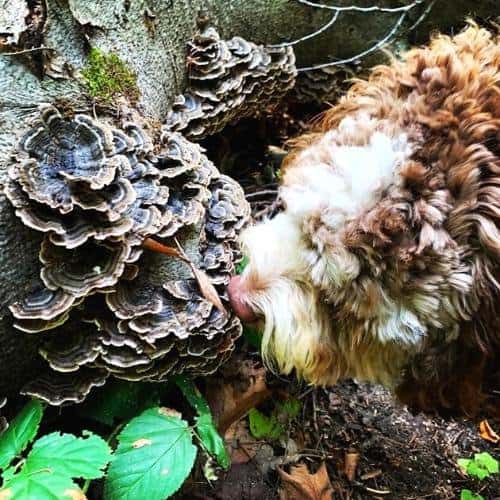
Besides immune system support, some of the historical uses of mushrooms for health and wellness are:
Additional uses of mushrooms are due in part to the other unique active molecules they contain. In the next section, you will find more details about a variety of functional mushrooms and how they can support your dog’s health when given as an extract.
The five mushrooms that can have the most benefit for your pet include:
There are a few other species of mushroom that have good applications for pets, but these 7 above really are the most important to know about. The first two, Reishi and Turkey Tail, have the largest body of research, but the other four also have good amounts of studies supporting their value and mechanisms of action.
Turkey Tail (Trametes versicolor) has the highest beta-glucan content of any medicinal mushroom. It also contains triterpenes and other like molecules that help to create its beneficial effects. Turkey Tail can help your dog with any immune system issue, including improving protective response to vaccinations, recurrent infections, and immune-mediated disease, as well as addressing the many factors that lead to malignant cell growth tailets.
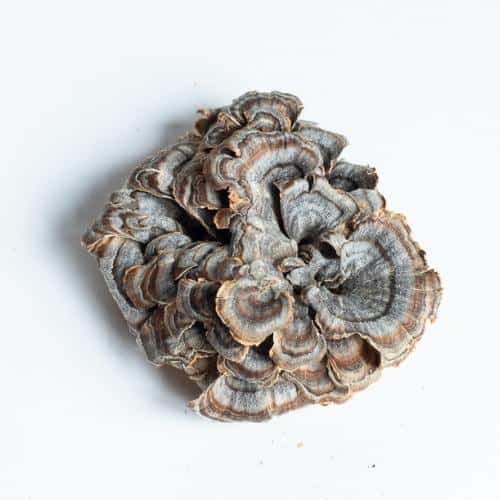
Learn more about the health benefits of Turkey Tail by reading our article, Turkey Tail Mushroom Benefits & Usage: A Complete Guide.
Real Mushrooms discloses the beta-glucan content in all its mushroom extract products. Given that its Turkey Tail extract powder contains >30% beta-glucans, there are 300 mg of beta-glucans in each 1g (1/2 tsp) of Real Mushrooms Turkey Tail powder. Use the following guidelines to determine how much of the product to give based on your dog’s health needs and weight:
Lion’s Mane (Hericium erinaceus), other than being a rather tasty edible mushroom, has special compounds in addition to its beta-glucan content that provide support for nervous system health. Researchers have discovered that these compounds, called hericenones and erinacines, can help maintain healthy cognition in animals as they age by protecting brain cells and providing nerve growth support [5] [6].
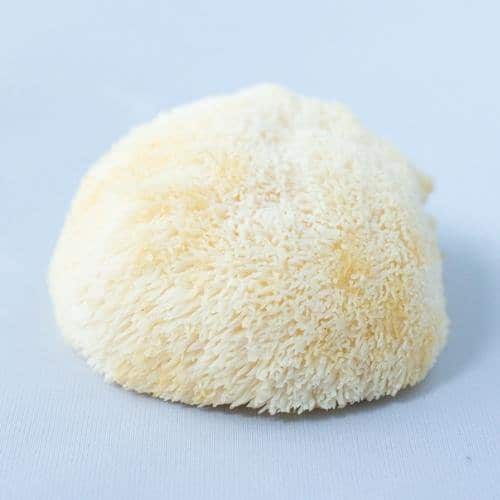
For our pets, Lion’s Mane can help with their brain function when they get older and develop a bit of senility or dementia. It can also help following closed head trauma, especially when combined with CBD and/or CBG.
Learn more about the health benefits of Lion’s Mane in our article, Lion’s Mane Mushroom Benefits: A Complete Supplement Guide.
Dosing of Lion’s Mane extract for your dog should be based on the mushroom powder’s content of beta-glucans. That information can be found on every package of Lion’s Mane powder extract from Real Mushrooms. If you are not using a Real Mushrooms product, then look for the beta-glucan content on the label of the product you are using, ato determinedelines below in determining the amount to give your own pet.
Real Mushrooms’ Lion’s Mane powder contains >25% beta-glucans, which means there are 250 mg of beta-glucans in every 1 gram (1/2 tsp) of powder.
The highest dosing tier for your dog should be 25 mg/kg of beta-glucans per day. In that case, a single gram of Lion’s Mane powder (1/2 tsp) would be sufficient for each 10 kg (22 LBS) of body weight of your pet, administered daily.
Reishi, or Ganoderma lingzhi, is called the “Mushroom of Immortality.” Its use predates written history by thousands of years, and modern uses based on scientific studies have greatly expanded its applications for people and their pets. Traditionally, Reishi was used to enhance focus during meditation and for longevity. It was prized among the Chinese emperor and high-ranking individuals in his court for these properties.
Reishi is an adaptogen, a type of nutraceutical that supports the adrenal glands in their management of stress. It has anti-histaminic properties, which when combined with its immune modulating properties makes it a good candidate as an ingredient in a formula for allergies for dogs and cats.
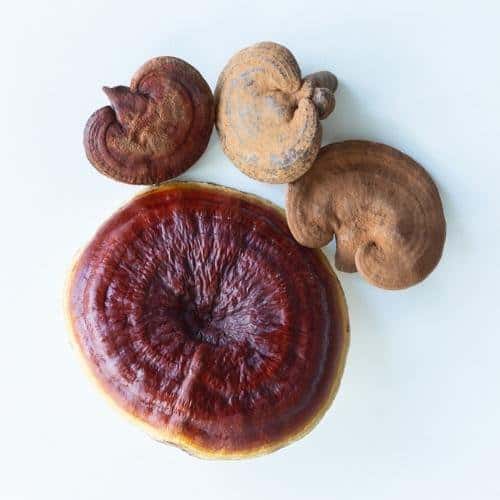
Its strong beta-glucan content, along with its associated triterpenes and other active molecules, allows it to address a number of health conditions in pets. It can help resolve acute and chronic infections in dogs, can complement pet cancer therapies, and its calming properties also makes it ideal as a sleep aid and to help anxious pets relax.
Learn more about the health benefits of Reishi by reading our article, Reishi Mushroom Benefits & Usage: A Complete Guide.
Dose Reishi for pets just as you would Turkey Tail, Lion’s Mane and the rest: by using the measured beta-glucan content to dose your dog or cat by weight. Just like its Lion’s Mane product, Real Mushrooms’ Reishi extract powder has >15% beta-glucans, or 150 mg for each gram of powdered extract.
Administer 1.5 grams (3/4 tsp) of Real Mushrooms Reishi powder to your pet for every 10 kg (22 LBS) of its weight daily.
Chaga (Inonotus obliquus) is an unusual fungus - however, it’s not technically a mushroom. It grows primarily on birch trees in Siberia, eastern Europe, Scandinavia, and northern Canada. Chaga is a hardened mass of mycelium (fungal “root” structures) and wood lignins. It develops into a hard “canker” as it feeds on its host tree (in other words, it’s a tree parasite). The bioactive molecules that the Chaga absorbs from the birch tree as it grows are what gives it medicinal properties.
Modern uses of Chaga for supporting human health that have been backed by scientific research include:
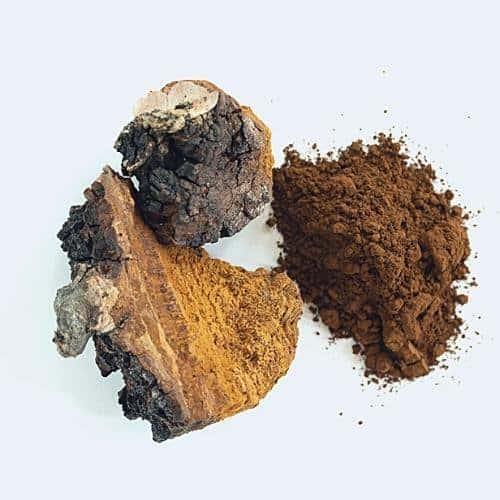
Few studies have been published in dogs or cats to date, but as with most of our mushrooms, what works for people can usually work to some extent in our pets.
Most pet parents I speak with think of Chaga for serious problems like cancer, but it can also help with digestive and immune issues.
Learn more about the health benefits of Chaga by reading our article, Chaga Mushroom Benefits: A Science, Health, & Supplement Guide.
Administration of the Real Mushrooms Chaga powder, either in bulk or provided in capsules is based on potency. Chaga, being made up mostly of mycelium, will typically have a much lower content of beta-glucans than mushrooms. However, the other “power” molecule in this unusual type of mushroom, betulinic acid, is derived directly from the birch tree and has potent immune system-supporting power.
One study used a beta-glucan dose of 6 mg/kg of Chaga extract in laboratory animals with experimentally induced cancer [7]. Using that as guidance, a 25 pound dog would receive 68 mg of beta-glucans from Chaga which is the equivalent of 8.5 grams (about 4 tsp) of the bulk powder daily.
Chaga, unlike other mushrooms, is high in oxalates. These can be found in other foods such as rhubarb, and spinach and can, in very large quantities lead to kidney stones. If your dog or cat has a history of bladder or kidney stones, then it is wise not to use this species of fungus.
The Shiitake mushroom (Lentinula edodes) is one of the most widely cultivated edible mushrooms in the world. It’s very tasty! Originally from Japan, where it grows on the evergreen Japanese Shia oak tree, it is now cultivated globally. Other than its fantastic taste, the Shiitake mushroom is one of the most widely studied as well, with thousands of high-quality controlled studies of its multiple potent constituents and their benefit to living beings.
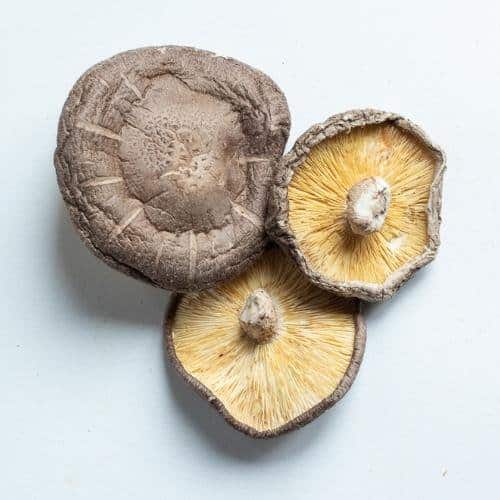
For instance, one well-documented human study demonstrated that the daily consumption of Shiitake mushrooms in healthy adults, produced enhanced immunity based on cellular and antibody immunity [8].
Shiitake mushrooms are a good source of ergothioneine, a uniquely powerful antioxidant found in mushrooms. Ergothioneine helps protect cell DNA from the damage that oxidative stress can cause, keeping the body more resilient to the effects of environmental stressors and aging. Like many functional mushrooms, Shiitake is an adaptogen, in that it supports the adrenal glands and helps the body to adapt to stressors, both acute and chronic.
Learn more about the health benefits of shiitake and ergothioneine in our article, Ergothioneine Supplement Guide: Facts, Benefits, and Usage.
Administration of Shiitake extracts to pets is optimal when given according to the beta-glucan content of the mushroom’s extract. You can find Shiitake extract in addition to Reishi, Maitake, Chaga, and Turkey Tail oyster extract in the Real Mushrooms 5 Defenders powder. This product has >20% beta-glucans, or 200 mg for each gram of powdered extract.
Administer about 1 gram (1/2 tsp) of Real Mushrooms 5 Defenders powder to your pet for every 10 kg (22 LBS) of its weight, daily.
Mushroom extracts are usually provided in a dosage form such as capsules or powder. Some pets don’t care what you put in their food that is good for them, but other pets are really suspicious.
For this reason, Real Mushrooms will be launching a line specifically for pets, formulated by myself, an integrative veterinarian with 30 years of experience as a practicing veterinarian in Boulder, CO, and a recognized expert in herbal medicine for pets, which includes the use of mushrooms, and nutraceuticals (also known as “supplements”)
Mushroom extracts are best given to pets based on the concentration of the active constituents in the product. The common denominator active ingredient for mushrooms is the beta-glucans.
All mushrooms have beta-glucans, and dosing should be based on the beta-glucan content of the mushroom product you are using and your dog's weight. This is the most effective way to give to your pet, as there are so many sizes of pets, from Chihuahuas to Giant Mastiffs, that using weight as a guide is a “no-brainer.”
The most potent extracts of mushrooms in products are the hot water extracts. For some mushrooms, like Reishi, also combining that with a dual extraction method is optimal. Dual extraction involves using hot water and alcohol will remove all the water soluble and fat soluble ingredients of reishi into the extract.
If a “mushroom” extract comes from mycelium grown on grain (MOG), then it won’t be as potent. Worse still, 30-60% of what you will be giving your dog will be grain carbohydrates, which, if your dog is on a grain-free diet or being treated for cancer, is inappropriate to feed. Also, myceliated grain has only a fraction of the potency as the active ingredients found in the mushroom (fruiting bodies).
If you would like to try mushrooms for your pet, you could go ahead and try any one of the single mushroom extracts from Real Mushrooms that I have described above. The use of a single mushroom allows you to escalate that dose to fairly significant levels for that single species of mushroom. Each mushroom species contributes its specific blend of active beta-glucans, triterpenes, and other active molecules to your pet.
However, providing a multiple mushroom blend can introduce a variety of healing molecules that wouldn’t naturally be combined if you were using single functional mushrooms. When combined into a multiple mushroom blend, there is a synergy among the multiple mushroom ingredients so that the sum of the parts is greater than any one of its parts individually.
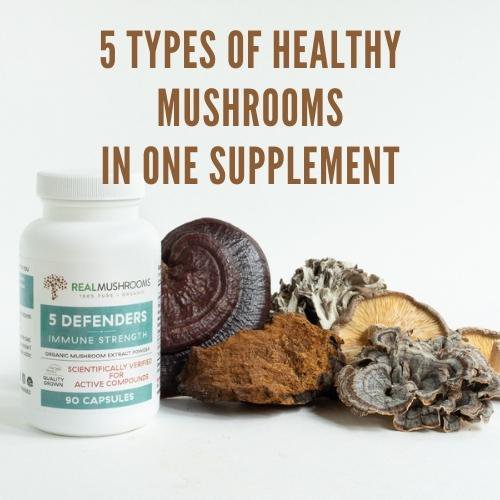
For Real Mushrooms, that combination product is called 5 Defenders. It contains 5 potent mushroom species: Reishi, Maitake, Shiitake, Turkey Tail and Chaga. It’s a simple way to begin providing your pet with excellent mushrooms for its health. As you become more familiar with how your pet responds to this mushroom blend, you could consider adding a single mushroom to the mix. The addition of a single-mushroom powder product such as Reishi, Chaga, or Turkey Tail can be beneficial if you are looking at your pet’s cancer problem, for instance.

Disclaimer: The information or products mentioned in this article are provided as information resources only, and are not to be used or relied on to diagnose, treat, cure, or prevent any disease. This information does not create any patient-doctor relationship, and should not be used as a substitute for professional diagnosis and treatment. The information is intended for health care professionals only. The statements made in this article have not been evaluated by the Food and Drug Administration. Any products mentioned are not intended to diagnose, treat, cure, or prevent any disease. The information in this article is intended for educational purposes. The information is not intended to replace medical advice offered by licensed medical physicians. Please consult your doctor or health practitioner for any medical advice.
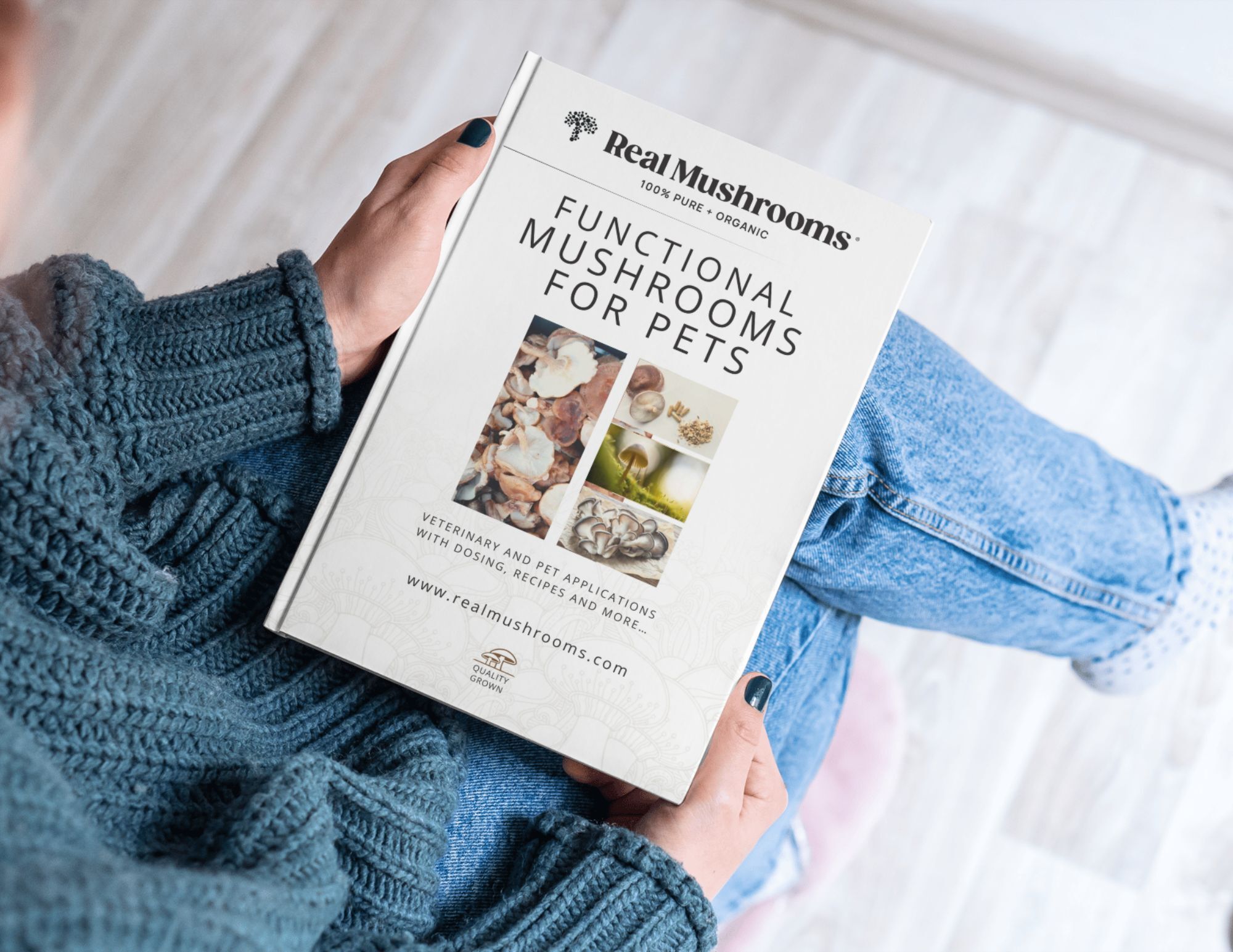
– Plus, Enjoy Exclusive Tips and Updates with Our Real Mushrooms for Pets Newsletter